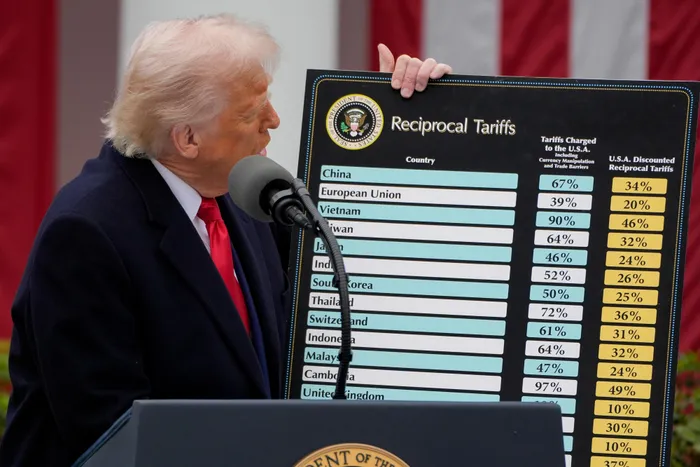
President Donald Trump holds a reciprocal tariffs poster during a tariff announcement in the Rose Garden on April 2.
Image: Kent Nishimura/Bloomberg
Lisa Isaacs and Jonisayi Maromo
WESGRO, the provincial Agency responsible for Tourism, Trade and Investment Promotion and Facilitation has set its sights on unlocking access to new markets and new buyers including China, the Association of Southeast Asian Nations (ASEAN), India, Brazil and the Middle East, while maintaining a continued focus on established markets in the EU, UK, USA and Africa.
This comes after US president Donald Trump announced reciprocal tariffs for several countries, including 31% for certain South African goods imported into the US.
Trump, while announcing the wholesale tariffs on countries including the People's Republic of China, United Kingdom, Singapore, India, Japan, and South Korea, remarked that "a lot of bad things" are going on in South Africa.
Wesgro said exports to the US from the Western Cape totalled R16.2bn in 2024, 8% of total Western Cape exports.
“The US is the second biggest export market for the Western Cape. Products that are exported include citrus, flat-rolled iron and related products, wine, fruit juices, vehicle and space components to mention a few.”
Wesgro said it wants to ensure stakeholders are well-supported in adapting to the new tariffs and their focus is to ensure that businesses can navigate these challenges with confidence and support.
“The ongoing adjustments to international tariffs and trade regulations present both hurdles and opportunities for exporters around the world. In light of these complexities, it is more important than ever for businesses to feel empowered and equipped in uncertainty.”
Wesgro prepared a resource to help exporters understand the trade landscape including how reciprocal tariffs will impact their product’s tariffs in the U.S and how to navigate the changes.
The information can be accessed by visiting: https://www.wesgro.co.za/export/resources/faq-navigating-united-states-tariffs
The South African Communist Party (SACP) urged the South African government to respond to the trade tariffs imposed by Trump.
Speaking after the SACP’s Central Committee meeting in Joburg, the party's spokesperson, Dr Alex Mashilo, said South Africa has to re-examine the trade concessions which were made in light of the African Growth and Opportunity Act (Agoa) deal around 2015, where the US was granted privilege to export to South Africa 65,000 tonnes of bone-in chicken pieces.
Back in 2015, South Africa’s powerful poultry industry agreed to exclude 65,000 tonnes of US chicken from the anti-dumping tariff - in return for the renewal of broader duty-free US trade access that benefited other South African industries.
Mashilo said that since the tariffs unleashed by Trump nullify the Agoa benefits, South Africa must also withdraw the trade concession to the US, including for the importation of the US chicken into South Africa.
"If South Africa does not do away with all the concessions it has made in exchange for access to Agoa, US goods will put pressure on local production and employment, and result in retrenchments in the affected sectors."
By withdrawing US's special access to the South African market, the move would not be viewed as retaliation but simply an effort by Pretoria to balance the trade, he said.
"There is no such thing called retaliation if South Africa withdraws from the concessions. The concessions for the importation of chicken from the United States were made on the basis that South Africa was benefitting under Agoa. When they have withdrawn the benefits, and South Africa maintains the concessions made in light of Agoa, would that be fair on South Africa? This would be just a move for a fair relationship, not a retaliation."
Last week, Minister of International Relations and Cooperation Ronald Lamola said the sweeping tariff measures will affect several sectors of the economy, including automotive industry, agriculture, processed food and beverage, chemical, metals, and other segments of manufacturing, with implications for jobs and growth.
Cape Times